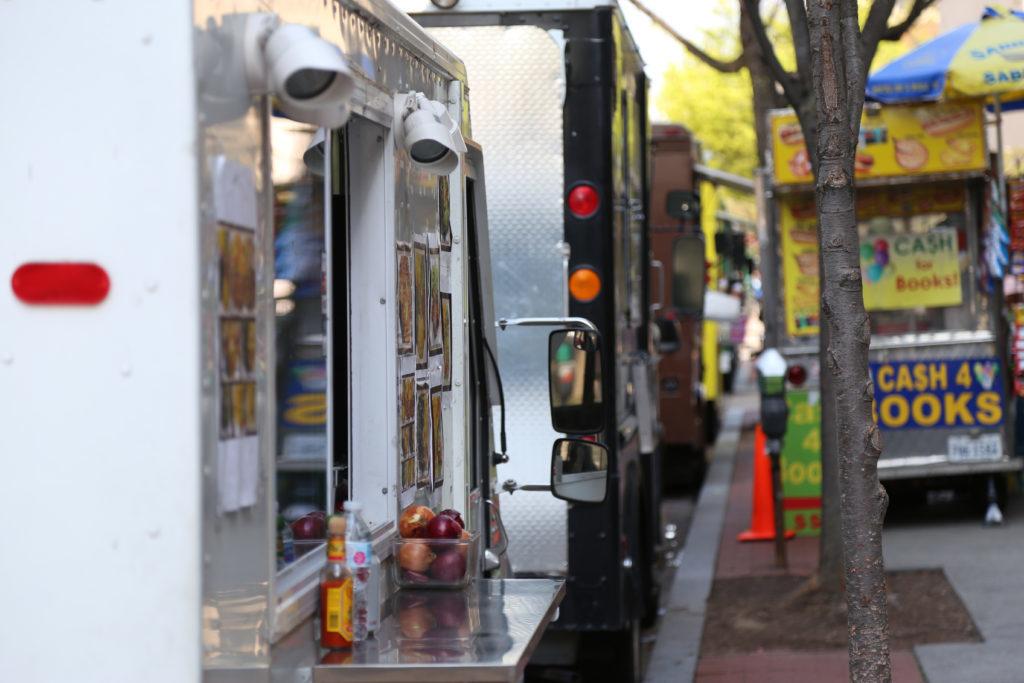Local food trucks may now face more competition for parking spots in the District.
The District Department of Consumer and Regulatory Affairs announced last month that they will change the regulations of the D.C. food truck lottery – which assigns prime parking spots on a monthly basis – to limit vendors to one truck entry in the lottery each month starting in May. Owners of large food truck companies said the lottery will hurt business because it prevents vendors from putting multiple trucks on the road, but owners with few food trucks said the new regulation helps to ensure truck owners won’t cheat the system.
Tim Wilson, a DCRA spokesman, said the rule change was implemented to level the playing field between vendors with several food trucks and vendors with just one by giving equal access to the most desirable lottery locations, like those in Farragut Square.
“This new initiative would ensure that each licensee has one entry into the lottery regardless of the number of food trucks under the license,” Wilson said.
He said the new system prevents vendors from entering more trucks than they own into the lottery to have a better chance at getting the best parking spots, a practice known as using “ghost trucks.”
“When those trucks aren’t there, they’re either being given to someone else in an unauthorized manner or they’re just not showing up,” Wilson said. “That space could very well be used by another vendor.”
Wilson added that D.C.’s approximately 450 food truck vendors shouldn’t be concerned about the change because the “one-truck-per-business” rule is temporary, and adjustments allowing more than one truck to enter the lottery will be made in June based on the results of the test run.
Some truck owners said they oppose the limitation because it significantly limits the businesses of vendors with a large number of trucks.
Matt Dang, the owner of Yumpling, a dumpling-serving food truck, said the change prevents him from serving the maximum number of customers possible with his six trucks.
“By only allowing one truck per business, it’s slowing their opportunity, especially when some of us have three to four, four to five trucks that are roaming the streets at different, various locations at different times,” he said.
Dang added that the lottery provides 60 to 70 percent of his company’s business because the assigned spots sit where the majority of customers are, like Metro Center and Franklin Square, and his trucks will lose about 34 percent of their business if only one is given lottery spots.
“If they do that, I have to think about certain different strategies in order to keep my employees employed,” he said.
But other truck owners said they support the limitation because it gives smaller food truck companies the opportunity to perform just as well as bigger businesses.
Gurnem Singh, the owner of the Indian Flavors truck, said the limitation does not change much for his business because he usually enters only one of his two trucks into the lottery. He said that the new policy makes the lottery more fair for smaller food truck companies.
“If you have seven trucks, and one owner only has one truck, one truck will go to two days in the lottery and seven trucks, they have three days each,” he said. “That’s not really good.”
Jesse Konig, the co-owner of the Swizzler hot dog food truck, said he was initially skeptical of the limitation because of protests from other vendors, but he received the same number of assigned spots when he entered one truck in the May lottery as he had previously received when he entered two trucks.
“That’s interesting to see because there’s maybe a chance that there were so many of these ghost trucks they’re trying to combat in the lottery that they were actually able to, with this program, make it a much more fair system where each truck gets more spaces,” he said.
Konig added that his truck has a dependable parking spot on H Street with lots of student traffic, but this limitation can be detrimental to larger food truck chains that derive more business from the lottery spots.
“They are pretty much basing their entire business around having a set schedule for the majority of their trucks,” he said. “They’re certainly in a much scarier spot right now than we are.”





